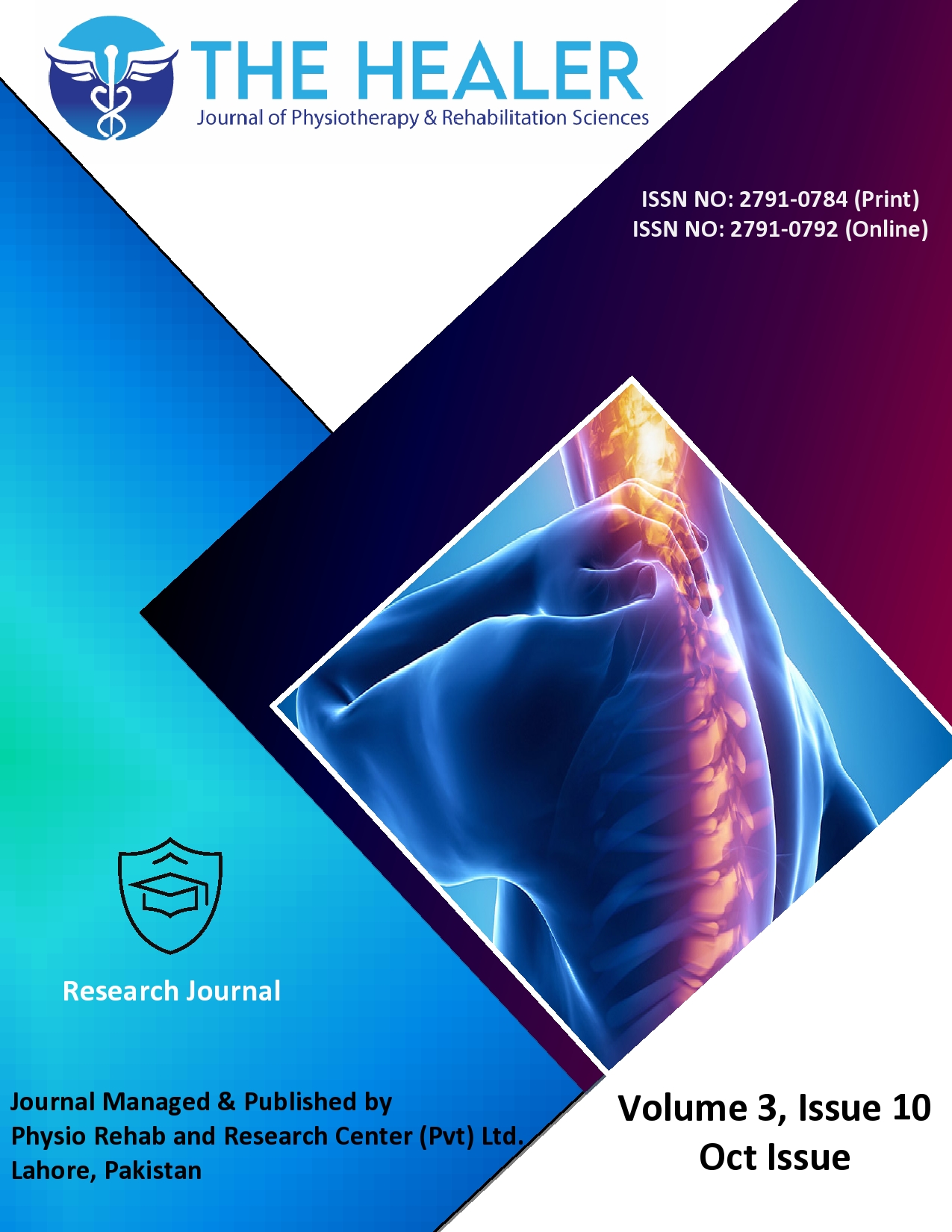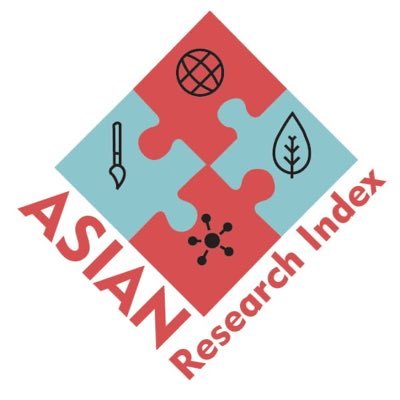Association of Depression with Rate of Recovery in Post-Stroke Patients; Analytical Cross-sectional Study
Association of Depression with Recovery in Stroke
DOI:
https://doi.org/10.55735/hjprs.v3i10.225Keywords:
association, depression, recovery, strokeAbstract
Background: Stroke has been recognized as a medical condition in which the supply of blood to the brain diminishes suddenly. It then eventually leads to the damage of the tissues permanently which is caused by hemorrhagic and thrombotic events. The most observed mood disorders in the survivors of stroke are anxiety and depression. Depression in post-stroke patients not only causes delays in functional recovery but also leads to poor quality of life. Objective: The basic objective of our current study was to draw out the association of recovery from stroke with depression in post-stroke patients. Methods: This study is an analytical cross-sectional study in which a convenient sampling technique was used to recruit participants in this study. We used a 22.9% proportion and found out the condition sample size to be 116. The Stroke Impact Scale was employed to measure the recovery from stroke and “Depression Inventory Scale” was employed to measure depression. The patients who suffered from ischemic stroke, both males and females suffering from stroke with the visible suffering of depression were recruited in this study and depression was analyzed in this study. All the other patients who underwent recent surgeries were excluded from this study. Data was collected after informed consent which was signed by every participant and the collected data remained confidential and was used for research purposes only. The result analysis was based on percentages and numbers. Percentages and frequencies were used to evaluate the association of recovery from stroke with depression in stroke survivors. Results: This showed that an increase in the depression score decreases the stroke impact score in post-stroke patients. Pearson’s Correlations between Stroke Impact Scale Score and Depression Inventory Scale Score show us that there is a significant negative correlation between the two outcome measures. Conclusion: This study concludes that an increase in depression in stroke patients decreases the recovery of stroke post-stroke patients. It also concludes that there is a significant negative correlation between the impact of stroke and depression.
Downloads
References
Mansur AdP, Favarato D. Trends in mortality rate from cardiovascular disease in Brazil, 1980-2012. Arquivos Brasileiros de Cardiologia 2016; 107: 20-5. https://doi.org/10.5935/abc.20160077
Bailey JJ. Promoting urinary continence: education program for nursing staff using the 3-day voiding record: The University of North Carolina at Greensboro; 2022.
https://libres.uncg.edu/ir/uncg/f/J_Bailey_Promoting_2022.pdf
De Ryck A, Brouns R, Geurden M, Elseviers M, De Deyn PP, Engelborghs S. Risk factors for poststroke depression: identification of inconsistencies based on a systematic review. Journal of geriatric psychiatry and neurology 2014; 27(3): 147-58. https://doi.org/10.1177/0891988714527514
Ayerbe L, Ayis SA, Crichton S, Wolfe CD, Rudd AG. Natural history, predictors and associated outcomes of anxiety up to 10 years after stroke: the South London Stroke Register. Age and Ageing 2014; 43(4): 542-7. https://doi.org/10.1093/ageing/aft208
Go AS, Mozaffarian D, Roger VL, et al. Heart disease and stroke statistics—2013 update: a report from the American Heart Association. Circulation 2013; 127(1): e6-e245. https://www.ahajournals.org/doi/abs/10.1161/01.CIR.0000441139.02102.80
Ellis C, Zhao Y, Egede LE. Depression and increased risk of death in adults with stroke. Journal of psychosomatic research 2010; 68(6): 545-51. https://doi.org/10.1016/j.jpsychores.2009.11.006
Mozaffarian D, Benjamin EJ, Go AS, et al. Heart disease and stroke statistics—2015 update: a report from the American Heart Association. circulation 2015; 131(4): e29-e322. https://www.ahajournals.org/doi/abs/10.1161/CIR.0000000000000152
Roth M. The natural history of mental disorder in old age. Journal of mental Science 1955; 101(423): 281-301. https://doi.org/10.1192/bjp.101.423.281
Sibolt G, Curtze S, Melkas S, et al. Post-stroke depression and depression-executive dysfunction syndrome are associated with recurrence of ischaemic stroke. Cerebrovascular Diseases 2013; 36(5-6): 336-43. https://doi.org/10.1159/000355145
Chohan SA, Venkatesh PK, How CH. Long-term complications of stroke and secondary prevention: an overview for primary care physicians. Singapore medical journal 2019; 60(12): 616.DOI: 10.11622/smedj.2019158
Guzelhan Y. Poststroke depression in obstructive cerebrovascular diseases of internal carotid and vertebrobasilar circulation system. Cor et Vasa 2022; 64(1): 25-33. https://actavia.e-coretvasa.cz/en/artkey/cor-202201-0005_poststroke-depression-in-obstructive-cerebrovascular-diseases-of-internal-carotid-and-vertebrobasilar-circulati.php
Fang J, Cheng Q. Etiological mechanisms of post-stroke depression: a review. Neurological research 2009; 31(9): 904-9. https://doi.org/10.1179/174313209X385752
Oni OD, Olagunju AT, Olisah VO, Aina OF, Ojini FI. Post-stroke depression: Prevalence, associated factors and impact on quality of life among outpatients in a Nigerian hospital. South African Journal of Psychiatry 2018; 24. https://www.ajol.info/index.php/sajpsyc/article/view/168598
Gbiri CA, Akinpelu AO, Odole AC. Prevalence, pattern and impact of depression on quality of life of stroke survivors. International Journal of Psychiatry in Clinical Practice 2010; 14(3): 198-203. https://doi.org/10.3109/13651501003797633
Oladiji J, Akinbo S, Aina O, Aiyejusunle C. Risk factors of post-stroke depression among stroke survivors in Lagos, Nigeria. African Journal of psychiatry 2009; 12(1): 47-51. https://www.ajol.info/index.php/ajpsy/article/view/30278/30489
Wang S, Wang C-X, Zhang N, et al. The association between post-stroke depression, aphasia, and physical independence in stroke patients at 3-month follow-up. Frontiers in Psychiatry 2018; 9: 374.
doi: 10.3389/fpsyt.2018.00374
Lee S-C, Lin G-H, Huang Y-J, et al. Cross-validation of the factorial validity of the Stroke Impact Scale 3.0 in patients with stroke. The American Journal of Occupational Therapy 2021; 75(2). https://doi.org/10.5014/ajot.2021.040659
Gebrie MH. An analysis of beck depression inventory 2nd edition (BDI-II). 2020. DOI: 10.31031/GJEM.2018.02.000540
Hashmi M, Khan M, Wasay M. Growing burden of stroke in Pakistan: a review of progress and limitations. International journal of stroke 2013; 8(7): 575-81. https://doi.org/10.1111/j.1747-4949.2012.00827.x
Paolucci S, Antonucci G, Pratesi L, Traballesi M, Grasso MG, Lubich S. Poststroke depression and its role in rehabilitation of inpatients. Archives of physical medicine and rehabilitation 1999; 80(9): 985-90.
https://doi.org/10.1016/S0003-9993(99)90048-5
Ayerbe L, Ayis S, Wolfe CD, Rudd AG. Natural history, predictors and outcomes of depression after stroke: systematic review and meta-analysis. The British Journal of Psychiatry 2013; 202(1): 14-21.
https://doi.org/10.1192/bjp.bp.111.107664
Morris PL, Robinson RG, Samuels J. Depression, introversion and mortality following stroke. Australian & New Zealand Journal of Psychiatry 1993; 27(3): 443-9. https://doi.org/10.3109/00048679309075801
Wulsin L, Alwell K, Moomaw CJ, et al. Lifetime depression and post-stroke depressive symptoms as predictors of stroke outcomes at 12 months. Stroke; 2008: Lippincott Williams & Wilkins 530 WALNUT ST, PHILADELPHIA, PA 19106-3621 USA; 2008. p. 639-40. https://doi.org/10.1016/j.jpsychores.2011.11.015
Turner-Stokes L, Hassan N. Depression after stroke: a review of the evidence base to inform the development of an integrated care pathway. Part 1: Diagnosis, frequency and impact. Clinical rehabilitation 2002; 16(3): 231-47. https://doi.org/10.1191/0269215502cr487oa
Spalletta G, Cravello L, Imperiale F, et al. Neuropsychiatric symptoms and interleukin-6 serum levels in acute stroke. The Journal of neuropsychiatry and clinical neurosciences 2013; 25(4): 255-63.https://doi.org/10.1176/appi.neuropsych.12120399

Downloads
Published
License
Copyright (c) 2023 The Healer Journal of Physiotherapy and Rehabilitation Sciences

This work is licensed under a Creative Commons Attribution 4.0 International License.














